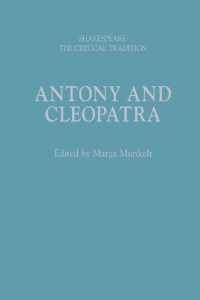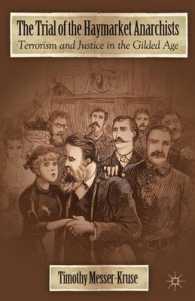Full Description
Centering liberation, justice, and cultural wisdom in the heart of relational work, this book provides a comprehensive and integrative examination of human development and the family life cycle through a decolonized, anti‑racist, and intersectional lens.
Written by a diverse collection of practitioners, educators, and scholars, tht book challenges the colonial roots of foundational family therapy models and offers bold alternatives that center agency, community, and healing. Chapters discuss essential topics such as family development and stages of the life cycle, relationship norms, gender and sexuality, neurovariance, grief and loss, healing, and more - all while exploring the ways in which systemic inequalities shape the lived experiences of individuals and families from diverse backgrounds. With real‑life stories and perspectives, this book provides essential practical guidance and tools to help mental health practitioners navigate and resist systemic barriers in their work and support an ongoing practice that fosters more inclusive, equitable, and responsive therapeutic relationships.
This book offers a new path forward for anyone who wants to practice healing in ways that are culturally affirming, politically conscious, and radically human. It is an essential resource for graduate students and practitioners in mental health programs seeking to develop their skills in working with diverse families.
Contents
Introduction: Breaking the Jar: Decolonizing Family Therapy from the Inside Out Part I: Unpacking Origins: Decolonizing the Foundations of Family Therapy 1. Breaking the Colonial Frame: Power, Privilege, and Family Therapy 2. From Pathology to Liberation: Decolonizing Family Well-Being 3. Beyond the Binary: Decolonizing Gender, Sexuality, and Family Development 4. Family Therapy in the Era of AI: Will Technology Advance or Erase Indigenous & Non-Western Practices? Part 2: Decolonizing Life Cycle Narratives -Systemic Intersections in Family Development 5. Goodbye Birds and the Bees: How Systemic Therapists Can Use a Reproductive Justice Framework to Rethink Family Building 6. Rethinking Childhood: Neurovariance, Cultural Strengths & Decolonialized Development Perspectives 7. Grieving in the Wake of Colonialism: Using Creative Arts to Explore, Process, and Integrate Bio-Psycho-Social-Cultural Perspectives of Loss and Grief Across the Lifespan Part 3. Beyond Therapy - Collective Healing, Advocacy & Alternative Knowledge Systems 8. Liberating Love: Rewriting the Fairytale and Expanding Relationship Norms 9. Agency-Centered Relational Therapy: Decolonizing Healing & Relationship Work 10. How Family Therapy Knowledge is Made and The World it Makes: Nonprofit Practice, Capitalism, and The Politics of Knowledge Conclusion








